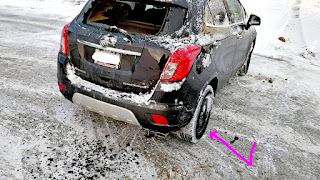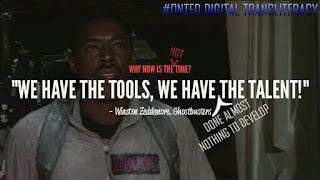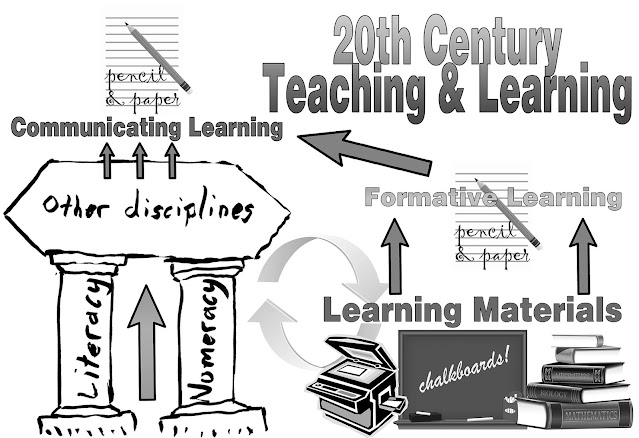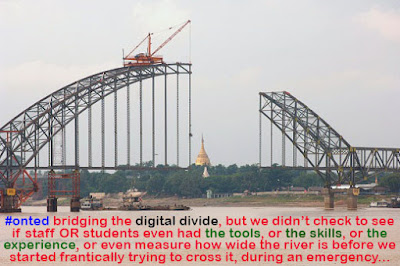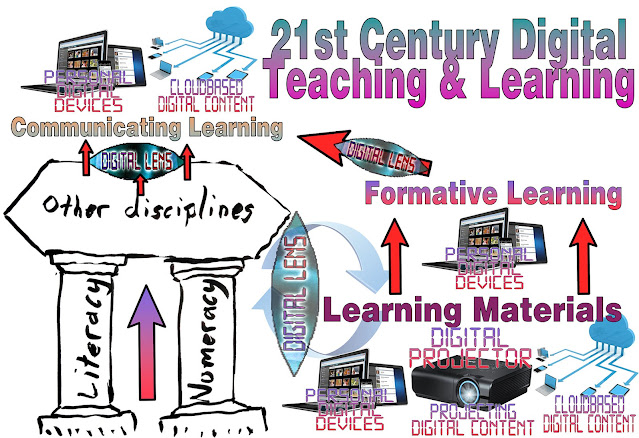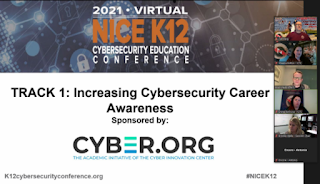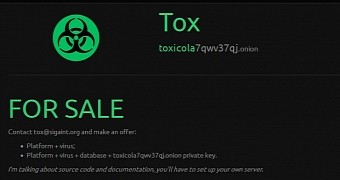SOURCES
The source(s) of this post (and a good example of the richness of thinking you can get out of an online PLN):
@MzMollyTL’s Digital Footprint discussion from ECOO last year that stirred up the new teachers in my AQ.
@melaniemcbride’s comment on the sweatshop mentality of the always on teacher:
@dougpete’s blog on edublogging:
http://dougpete.wordpress.com/2012/08/03/this-week-in-ontario-edublogs-27/
…which led to some interesting questions about online presence:
http://dougpete.wordpress.com/2012/08/05/dont-hurt-yourself-with-social-media/
Phew! That is a lot of build up! Here I go…
DIGITAL FOOTPRINT 2.0
I think we’re ready for an evolution in what our expectations are around this. Diana’s original presentation suggested that teachers need to familiarize themselves with online media, and that is still true. However, since that presentation there have been political upheavals supported by social media, underground poltical movements powered by social media, and I’m currently watching the ‘Twitter Olympics’: the first really social media powered Olympic games. Even the forth estate is grudgingly trying to manage the tidal wave of social media. Merely familiarizing yourself isn’t going to cut it anymore. Ignoring it will make you irrelevant to your students with astonishing speed.
Social media is becoming mainstream and there are increasing expectations that people know how to use it. Only in extremely staid, conservative situations (educational administration) is social media being shunned. Even the very conservative family reunion I attended recently wanted to start making use of social media to keep in touch, and these were people who play banjos. Social media is becoming ubiquitous, even unhooking the Ontario government’s ability to manipulate media into justifying its agenda. This is a powerful force, not something to be trifled with or poked at tentatively. If you’re going to do it, do it honestly, and be yourself. You’ll find the ability to expand your interests online empowering if you don’t try and game it.
POCKET NETWORKS
The social networks we see spring up like mushrooms in the rain are being prompted by the miniaturization of computer hardware. Smartphones are increasingly common, and since 2010, the vast majority of ‘phone’ use has been in data, not voice. We use our mobile computers as interconnected computers, not as phones. Our students do it, we do it, even boomers are doing it. Like the telegraph, then the telephone after it, this is a revolution in how we communicate with each other, and almost everyone is carrying around the means in their pockets.
Our classrooms have more processing power in the pockets of students than desktop labs did ten years ago. Their ability to communicate is unparalleled in history, and disregards geography like no other telecommunications system before it. Just hoping that everyone considers doing something with their online presence is no longer enough, and ignoring or banning the hardware that is causing this is turning a blind eye to a profound shift in social communications. Schools that ban smartphones should be banning other new inventions, like electricity, telephones, televisions… which very quickly starts to look backward.
GENUINE ONLINE PRESENCE
Being online offers you an opportunity to be anonymous, but this requires a great deal of work on your part. The nature of the internet means you’re always leaving digital bread crumbs about how and where you’re communicating from. Anti-web types will use this as an excuse to harp on privacy issues, but when have we ever been able to communicate privately? Gossip has always been and always will, and what you say has always followed you, it just follows you in an amplified manner now. Social media allows you to broadcast gossip. If you were a gossip before, you’re a digitally enhanced gossip now. It’s never been more important to be the best person you are in public; there is a record now, and I’ve seen students constantly bitten by this as their Facebook updates land them in the VP’s office.
The genuine self as an online presence offers an opportunity to meet others beyond your geographic situation that share your interests. You quickly find yourself a part of an online community that reflects your predilections and offers you a sense of collaborative discourse that might be missing in your workplace, or your immediate geography. If you’re genuine in expressing your interests, you’ll create a genuinely satisfying social media ecosystem. If you fabricate yourself, or limit yourself to specific identities (your teacher self comes to mind here), you won’t be exploring the actual usefulness of this new medium.
The other advantage of being genuine online is that you attract meaningful dialogue. If you’re one dimensional, you tend to attract n00bs, marketing interests and bots (who are also one dimensional). If you’re genuine and human in your presentation of self, you’ll attract a richer class of connection, one that offers powerful insights regardless of where you are in relation to each other on the planet. You’re harnessing the true potential of social media when you are multi-dimensional and human in your approach to it.
Developing a digital footprint is no longer about simply participating, or creating a cardboard cutout of your professional self, it’s about honestly expressing your own views in a genuine manner. The myriad of apps and means of communicating in a social network allow you to express yourself in simple (twitter), complex (blog) or focused interests (Google+, Facebook) ways. Knowing how to use the tools effectively is key.
If you’re fabricating a professional appearance, well, that’s just work, and doing it all summer, 24/7 is not going to do you any real good. Ultimately, you’re doing an awful lot of work and not exploring this new medium effectively, probably because you’re scared of it.
School Leadership 2.0
Several school administrators made comments in Doug’s blog about the need for restraint. In a leadership role, you’re not free to fly off the handle whenever you have an opinion. You always need to consider the working relationship you have to foster. Having said that, George’s comment about social media being a useful tool in fostering a team based on real knowledge of each other suggests that social media can be a means of allowing people who might not otherwise to know each other better.
The tendency has been for management (union, board, ministry, and any other ed-based management you can suggest) to shy away from social media. They fear the de-centralization of power, and see it as a threat to their dominance. It’s nice to know some administrators are fighting this tendency, but I’ve heard of many more who don’t hire the best candidates because their online presence creates unease, and in worst cases not considering hiring a teacher at all because they are familiar with the social web that most students spend their lives in. Why they think that hiring belligerent, intentionally irrelevant teachers is a good idea is beyond me.
What I love about social media is that it is democratizing information. No longer do we have to succumb to the broadcast media’s idea of what is true. Twitter told me about Bin Laden hours before broadcast media would, or could. As a social media-ist, I’m responsible for vetting my own information feed, and broadcasting my own truth. As both a leader, and a professional, this means not being a jackass, but being a meaningful social mediaist requires this from the get go. If you’re going to do social media well, being a gossip, spreading untruths, will eventually turn the crowd on you. Generating drama and controlling spin doesn’t work very well in a democratized information medium; the truth just bypasses you.
Social media is an opportunity to build a more ideal information medium, one without favoritism or fabrication, one that does not favor the status quo in order to maintain it; the crowdsourced truth is dangerously unmanageable… and free from spin.
As a member of that tribe I try not to let invective and one-up-man-ship dictate my actions, I try to be collaboratively engaging. This isn’t contrary to any professional or leadership role I may have; in fact, it should enhance those roles. When you broadcast your actions, it behooves you to it well.
CONCLUSION: THE REVOLUTION IS HAPPENING, REGARDLESS
The social media revolution has harnessed mobile electronics and the internet to produce a democratized media frenzy. Old-school, forth estate media is floundering, trying to manage their loss of broadcasting monopoly, but still seeing it as an immanent threat. Other power structures are also frustrated by this decentralization of voice. Where once a hierarchy could dictate the message, now social media swirls around these old-school broadcasting roadblocks.
Unions are watching members broadcast their opinions directly, without being able to dictate a unified response. Governments and corporations are finding that the dictatorial control they once had over traditional media is weakening, because traditional media matters less. As social media responses bypass traditional censorship, we once again see the many assert their power.
There is no doubt that these changes will force a fundamental shift in how we work with each other. This kind of radical, data driven transparency gives control freaks a nervous breakdown, but in the end, I can’t believe that freeing the signal from the self-involved interests of the powerful isn’t better for everyone; that it will result in fairer, transparent, more effective organizations.
As educators, we have to try and get a grip on this ourselves, and then be ready to try and (usefully) assist our students in effectively navigating this exciting, historical change. It’s no longer enough to pay some attention to what your digital footprint is. It’s no longer enough to do the minimum necessary. If we’re going to teach future generations how to survive in the rough sea of democratized data we’ve made for them, we need to adapt and master the waves ourselves.
A relevant educator is recognizing the radical nature of these changes and is doing their best to create a genuine online persona, one that accurately reflects the public persona they demonstrate in their physical life. What’s private isn’t at issue here, but our public selves are changing, and it doesn’t do anyone any good to try and game social media by making cardboard cutouts of themselves online.
Some things to consider:
Dancing in the Datasphere: a philosophical look at where we are going
The Singularity: an inside look at what Silicon Valley believes is coming
Don’t kid yourself, you’re living in the middle of a revolution!






